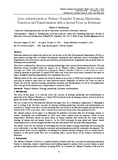Socio-cultural trends in Women's Founders Training, mentorship, transition and transformation with a special focus on Botswana

View/
Date
2012-12Author
Raditloaneng, W.N.
Publisher
CCSE, http://www.ccsenet.org/ellsType
Published ArticleMetadata
Show full item recordAbstract
Botswana women have historically played very crucial roles in the Non-Governmental Organizations (NGOs) as great partners and gap fillers in national development. Among the most important aspects of founding NGOs organization is the need to train, mentor and transform, and transit from the organization with no doubt about its autonomy and sustainability.
This article is informed by a Based on a workshop methodology with a total of twenty women from the USA and Botswana women assembled under the auspices of the Women’s Affairs Department and have occasional meetings since 2008. A key finding from studying the Women’s Founders Collective is that women are socio-culturally groomed to participate in unpaid NGO work even if they have been trained, mentored and make an impact enough to transform organizations and communities they serve.
With the advent of the cash economy, the trends of women as key actors in NGOs have changed to include men especially in instances where there are some financial rewards. Regardless of whether key actors are men or female, the need for intensive training, mentorship, transition and transformation can not be overemphasized. This is the gist of the journal article, using women as a point of contact.
